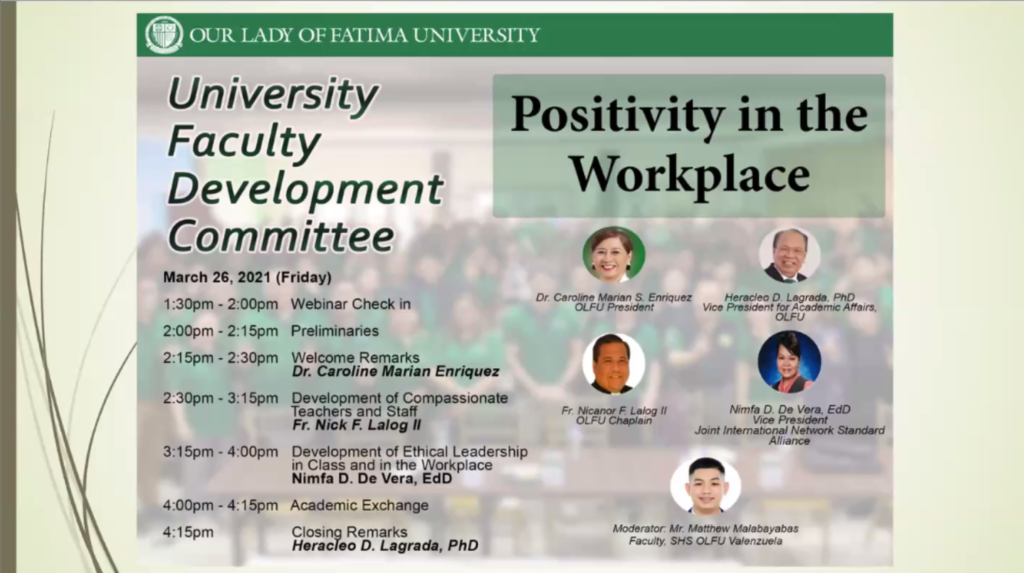26 March 2021
With the ongoing pandemic, the normal course of life has since been disrupted; still, it has to go on. While it may be difficult, societies and economies continue to adapt to the situation by reinventing multiple aspects— the classroom and especially the workplace are no exceptions.
Recognizing that this period of change may be burdensome for many, the University Faculty Development Committee (UFDC) of Our Lady of Fatima University (OLFU) continues to seek ways of supporting, empowering, and engaging its workforce.
Last 26 March 2021, the Committee hosted a webinar entitled “Positivity in the Workplace,” focusing on the topics of compassion and ethical leadership which are virtues that, no matter the setting, still remain significant.
Welcoming everyone into the online event was University President, Dr. Caroline Marian S. Enriquez, who shared her thoughts on radiating positivity at work. “Part of becoming positive in the workplace is having a concept of humbleness and at the same time, a willingness to learn. If you’re humble and willing to learn, then you can move forward with appreciation,” she said.
The first guest speaker was University Chaplain Fr. Nicanor “Nick” Lalog II who gave a talk on the “Development of Compassionate Teachers and Staff.” He delivered a very timely discussion on compassion (malasakit) by presenting his points against the backdrop of the COVID-19 crisis, which he said “is not just a medical and a social issue of our time.”
“It has to be seen in the light of spirituality and morality. What is God telling us in this pandemic?” asked Fr. Nick. “The Lord is trying to teach us something very important at this stage of our lives as a nation and as a global community.” With this premise, Fr. Nick discussed lessons that teach about being compassionate, which he later summarized into a simple yet powerful term: “love.”
“To love means to see the other person as the image and likeness of God, to be aware of the dignity of every person. To love the other person is to see the community, to always see the common good, not only of one individual but of individuals, of persons. To love is to always be truthful— love is not being said; love is always being done. And last but not the least, to truly love is to be a communicative person,” he said.
The second guest speaker of the webinar was Dr. Nimfa D. De Vera, Vice President of the Joint International Network Standard Alliance with the talk, “Development of Ethical Leadership in Class and in the Workplace.”
Discussing the definition of ethics and its importance, ethical leadership, its benefits and recommended practices, she actively engaged the attendees by relating the topics to the OLFU context, vision-mission, and core values, which, according to her, make up the Fatima community’s unique “DNA.”
“You have to be able to learn more because there will be a lot of adjustments on our part; to be more inspired by your common vision, mission and core values, and most importantly, every day, to live a life of purpose in the fullness. That life of purpose should be connected to your personal vision, but it should also be connected to your DNA as Fatimanians,” she encouraged everyone.
Participants were also given the chance to virtually interact with the speakers through a short question and answer session.
To formally conclude the event, Dr. Heracleo Lagrada, the Vice President for Academic Affairs, Dean of the Graduate School, and Chair of the UFDC, gave some words of encouragement and gratitude. “We understand and believe in the need to nurture positivity in our individual and collective outlook towards our environment, our community, our families and our workplace— Our Lady of Fatima University,” he began.
“As teachers, oftentimes without us being consciously aware, our way of looking at life and the manner by which we react to the conditions around us have impacted strongly on our students and fellow workers,” Dr. Lagrada acknowledged, stressing that positivity in class and in the workplace begins with the educators and employees themselves. “We certainly cannot imbibe positivity without us first being positive in our outlook in life, in words, pronouncements, and in our dealings with our students and fellow workers.”
Dr. Lagrada also thanked the speakers, reiterating their notable insights, and the organizers who have made the event possible. As a closing note, he motivated everyone: “Let’s all work together to foster, nurture, and exude positivity and optimism in our classrooms, offices, and campuses.”

